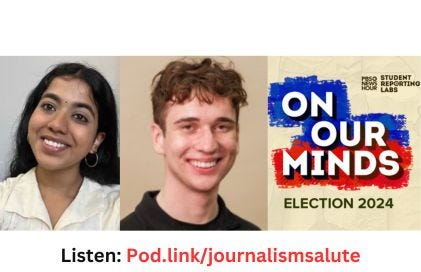An episode for the weekend: Student journalists Poojasai Kona and Nico Fischer
The PBS Student Reporting Labs podcast hosts share their experiences
Can you please take a moment to fill out my listener survey (click here)- shouldn’t take more than 5 minutes and will help guide future podcast decisions. Thank you.
On this episode we're joined by student journalists Poojasai Kona and Nico Fischer. They are wrapping up their time as this season's hosts for On Our Minds: Election 2024, a podcast run by the PBS News Hour Student Reporting Labs. Poojasai is an 11th grader at Frisco High School in Texas. Nico is an 11th grader at Santa Clara High School in California.
When I was talking to the two students, I felt like I was talking to adults who were seasoned journalism professionals, as both Poojasai and Nico talked about everything from initially being rejected to the interviews they did and segments they created in which they shared their insights in a way that was relatable to teenagers. They also had thoughts on what being a journalist meant to them.
Here are some of my favorite comments from the conversation, some of which are excerpted from longer answers and edited for clarity.
Hope you'll listen to the interview too!
(you’ll also hear from PBS’ Briget Ganske and Christine Zirneklis in the episode)
Nico on the path to hosting
" I got involved with KQED, which is the NPR station based out of San Francisco. I got involved with Student Reporting Labs, joining their second student advising team for that year.
And then I applied to be a host for On Our Minds. But I actually got rejected, which was such a blow, but I didn't let that stop me. I remember when I got rejected, I was like, oh, this podcast feels like it's speaking to me.
And I actually printed out that email with my rejection and hung it on my wall. And I told myself, someday I'm going to be an On Our Minds host. And now we're here."
Poojasai on what goes into hosting a podcast
"It's just a lot of yapping, to be honest. With the FaceTime calls and everything, me and Nico were like, oh my god, we should talk about that, oh my god, we should go into that. Just constant yapping. During our recording sessions we would have, it would just be yapping, pure yapping.
It's funny because I think Nico and I always had that type of chemistry where we would just talk about something and we just keep building on it and we just hit this kind of epiphany where we're like 'Oh my god, this is amazing. I think this will resonate.'"
Nico on a mentality of always learning and trying new things
One mantra that I've tried to apply to my life this year is that if I'm not failing, that means I'm not trying hard enough.
Because if I'm good at everything I'm doing, then that means there's something wrong. I'm not challenging myself. So that's one thing that I've been trying to apply to my life."
Poojasai on her place in the industry:
I've heard people say, hey, it's dying field. No it's not. You guys are wrong. It's always going to be there because if we don't have journalism, how do you think you're knowing what's happening around the world.
I feel like journalism is really the only way you can use to find those human stories, remind you what humanity really is. And I want to say my place in it … we'll see career wise. I will say that I'm absolutely going to always find a way to be connected with journalism. I don't know how that's going to happen. Journalism holds a very special place in my heart. It's given me so many opportunities. It's taught me a lot of things about myself, about the people and the places and just things around me in general.
We're always going to be in a love relationship. I'm never going to hate journalism. I'm never going to leave it.
Thoughts on young journalists and youth journalism
Poojasai: Just listen, just listen, just understand. Don't yap. Control the yapping and just listen. The amount of stuff I've learned in journalism, because I wasn't the one talking, but I was on the other side and I was doing the listening. The things you learn from listening are wild. I'll say any journalist, especially when you're just starting out, just take the time, breathe, and listen.
Nico: I think youth journalism as a space is a little bit of a predicament. Most organizations nowadays have youth advisory groups, but when you look at who is a part of these youth advisory groups, it's a lot of the same kind of kid: Kids with amazing credentials, probably great grades, a lot of them growing up in upper-class suburbs and the truth is, is that a lot of these folks aren't very representative of American youth as a whole.
Of course, they're representative of the chunk they're a part of, but if we want to reach America as a whole then we actually need to include all youth in the decision-making process.
I'm sure a lot of folks who are listening have probably heard of the NPR accent.
It's this stereotypical, intellectual, upper-class accent that a lot of NPR hosts use. And I think stuff like that is a turnoff for so many American youth, because they don't feel themselves represented in that. So I think my message to journalists and the journalism industry as a whole is that if you want to see profit, right, if you want to see people listening to you, watching you, paying for subscriptions, then you better be ready to meet all American youth at the table, not just the select few who have incredible credentials.
Find us online:
Twitter LinkedIn Bluesky Instagram
Many other links: https://linktr.ee/marksimon1975




